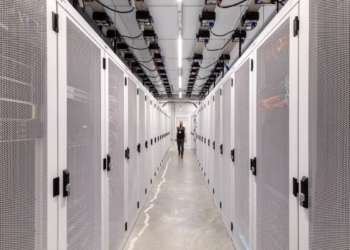Safeguarding data centres: A strategic necessity
Author: Isha Jain

By Ruari Cairns, Director of Risk Management and European Operations, True, powered by Open Energy Market
In the digital era, data centres power the essential infrastructure that supports our interconnected world. These facilities serve as the custodians of vast datasets that fuel our daily lives. Yet concealed beneath this digital revolution lies a critical aspect of data centre operations that remains overlooked: the susceptibility to power outages and the absence of regulations to shield against them.
The energy consumption challenge
Data centres rely on an uninterrupted, high-power electrical supply for their operations. Recent findings from the International Energy Agency (IEA) underscore that data centres currently consume a remarkable 1% of global energy. Projections indicate that this figure could potentially triple by 2030, creating a significant hurdle for the industry’s infrastructure.
Any disruption can result in high costs and the disruption of vital services. While data centre operators allocate substantial resources to backup power systems like uninterruptable power supplies (UPS) and standby generators, there are limitations to their methods in mitigating the repercussions of prolonged power interruptions. The surging energy demand within the industry, coupled with an increasingly volatile energy market, creates a potentially precarious scenario.
The regulatory gap
Complicating this situation is the lack of regulatory safeguards for data centres in the event of power failures. Unlike sectors of similar critical infrastructure, data centres do not enjoy the same level of regulatory protection.
A recent report by Aggreko highlights that power outages have emerged as a serious concern for data centre professionals across Europe.
These outages stem from a range of infrastructure issues, including grid power shortages, aging equipment, and fluctuating power demands. The report emphasises that the industry’s lack of regulatory oversight stands in contrast to other sectors.
This regulatory vacuum forces data centre operators to proactively steer their energy procurement and resilience strategies. Relying on external interventions or placing hope in improved grid reliability no longer represents a safe approach.
Navigating the terrain of energy procurement
Data centres serve a diverse range of customers, each with unique energy consumption profiles and risk thresholds, from major corporations to government agencies and small businesses. To meet their customers’ various needs, data centres must navigate the intricate landscape of energy procurement.
Strategic energy procurement
Data centre operators must approach energy procurement strategically, evaluating various factors, including energy supply reliability, environmental impact and future cost volatility. Strategic energy procurement, involving specialists like True, powered by Open Energy Market, transcends the mere selection of the lowest-cost energy source, as it takes into account the long-term sustainability and resilience of data centre operations.
In a sector where external variables, such as global conflicts and shifting renewable energy landscapes, can influence energy markets, strategic energy procurement provides a means to adeptly navigate uncertainty. As seismic geopolitical events disrupt energy markets, strategic energy procurement empowers organisations to stay ahead.
The role of data-driven analytics
In the pursuit of strategic energy procurement, data-driven analytics play a pivotal role. Advanced analytics help data centre operators understand their energy consumption patterns, pinpoint vulnerabilities, and fine-tune their procurement strategies. This precision equips data centres to make accurate decisions aligned with their customers’ business objectives.
An effective energy procurement strategy harmonises with sustainability objectives, facilitating data centres’ transition to renewables and reducing their carbon footprint in compliance with regulations and public sentiment.
Anticipating regulatory shifts
In a world where environmental awareness and energy efficiency have taken centre stage, data centre operators must adapt to a dynamic regulatory environment. Regulations like the EU Taxonomy Regulations and the UK Emissions Trading Scheme introduce higher oversight into data centre operations.
Final thoughts
This ever-changing regulatory landscape underscores the critical role of data centres in prioritising energy efficiency, sustainability and environmental responsibility. While concerns about power outages persist as an issue, they also present an opportunity for data centre operators to proactively shape their energy procurement strategies.








